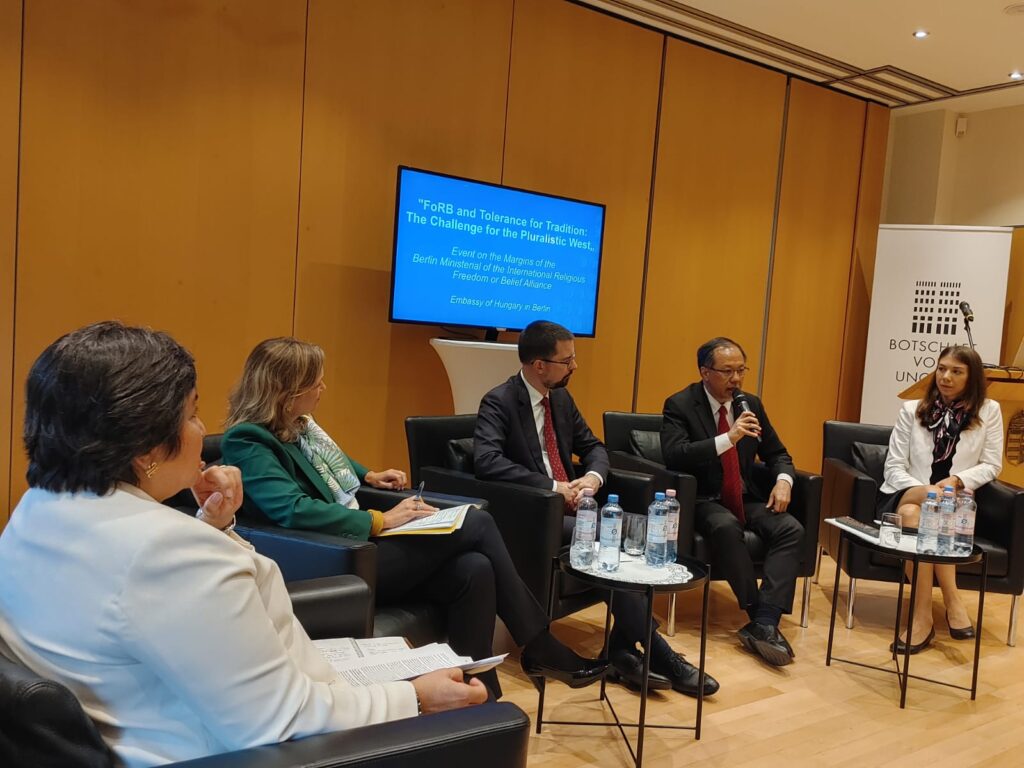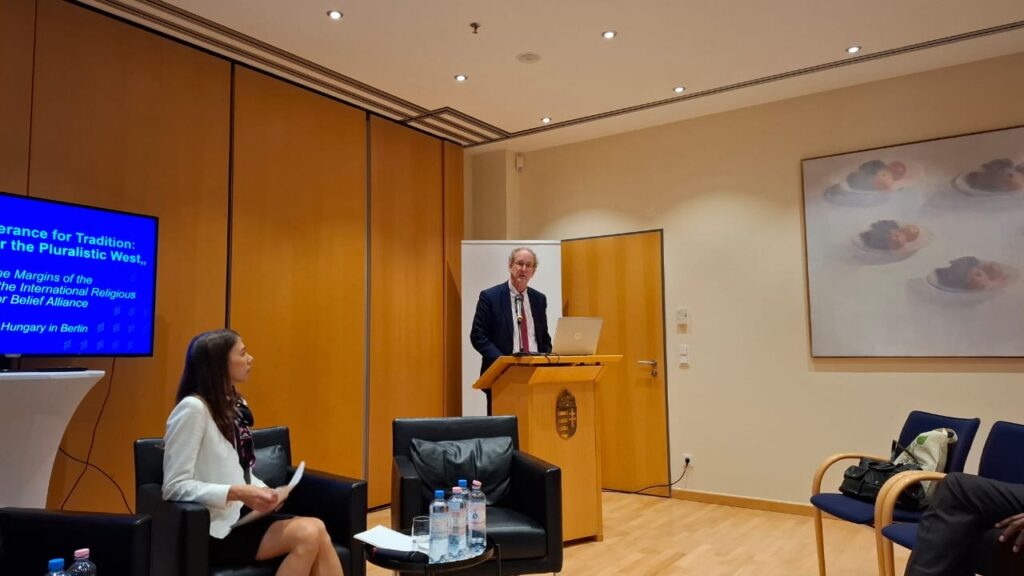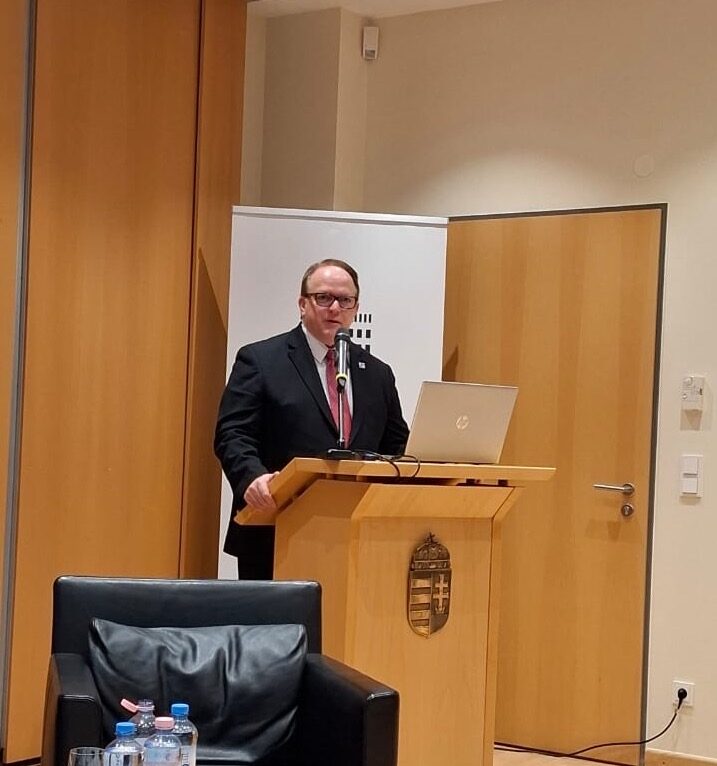Religious freedom experts from Asia, America, and Europe gathered yesterday on the margins of the Berlin Ministerial of the International Religious Freedom or Belief Alliance (IRFBA), an alliance of 43 states committed to advancing freedom of religion worldwide, to discuss increasing intolerance of religious believers who adhere to traditional teachings on marriage, family, gender, and human nature in Europe and North America (see RFI’s press release announcing the event).
The event titled, “FoRB and Tolerance for Tradition: The Challenge for the Pluralistic West” was co-organized by various non-governmental and governmental religious freedom organizations as well as religious organizations that follow and support IRFBA, including: the Commission of the Catholic Bishops’ Conferences of the European Union (Brussels), the Observatory on Intolerance Against Christians in Europe (Vienna), the Hungarian State Secretariat for the Aid to Persecuted Christians (Budapest), and RFI (Washington, D.C.).
The institutions that monitor and advance religious freedom in the EU and around the world have come together in response to a common concern: religious believers in the West are increasingly being targeted, marginalized, and sometimes even prosecuted for peacefully expressing their traditional religious convictions about family, marriage, and human nature. This problem must be addressed to safeguard the pluralistic societies of Western democracies.
“This phenomenon, which Pope Francis has aptly described as ‘polite persecution,’ can be understood as compelling policies and legislation, as well as social pressure, that undermine and curtail Christians’ possibility to express and live according to their moral and religious principles in contemporary liberal societies,” said Dr. José Luis Bazán, Legal Adviser for Migration & Asylum and for International Religious Freedom, Commission of the Catholic Bishops’ Conferences of the European Union (COMECE).
Marcela Szymanski, Head of International Advocacy at Aid to the Church in Need and member of the IRFBA Council of Experts, spoke about the prevalence of this “polite persecution,” stressing that the Global South is often punished not only ethically and spiritually, but also materially, when the West imposes values contrary to those widely held in those societies. It is troubling when western countries apply a conditionality clause linked to controversial issues locally, instead of allowing citizens there to adopt related measures themselves. For example, cancelling loans from the World Bank to an African country on ideological grounds has many regrettable consequences for that society.
Dr. Katharina von Schnurbein, European Commission Coordinator on Combating Antisemitism and Fostering Jewish Life highlighted the importance of upholding and securing the practice of religious freedom in Europe. “We need to find ways to reconcile religious freedom with our other values – because they are compatible and not in conflict,” Schnurbein said.
“It is very worrying that the peaceful expression of personal religious beliefs, such as ‘God created human beings as male and female’ or ‘Marriage is a union between one man and one woman,’ can be the end of a political career or employment or even the beginning of a court case. This is a serious threat to religious freedom and is leading to widespread self-censorship among traditional believers in the West,” stressed Anja Hoffmann, Executive Director of the Observatory on Intolerance Against Christians in Europe.

Eugene Yapp, Pastor at-large for Churches in Malaysia and one of the members of the IRFBA Council of Experts, highlighted the need for the West to accommodate traditional communities from the Global South. Coming from a highly pluralistic country, he emphasized that “Southeast Asians have always found ways to make reasonable accommodation for different religious practices and ways of life, even if many of these religious traditions at times seem conflicting.”
Márk Aurél Érszegi, Special Advisor for Religion and Diplomacy, Ministry of Foreign Affairs and Trade of Hungary, explained – on the basis of Papal teachings – that maintaining a “cultural equilibrium,” based on the traditions and values of a given region in our Western world, can protect against “ideological colonization that would cancel differences.” A “polyhedral model” of integration that preserves the identity of its components can ensure inclusiveness of tradition that seems to be a challenge for the pluralistic West. This is the model followed by the Hungary Helps Program, too, he pointed out.
The Senegalese Minister of Justice, Ousmane Diagne, in his address to the audience, underlined the importance of freedom of religion in fostering cohesion and peace in the society.

In response to these issues, Todd Huizinga, RFI Senior Fellow for Europe, announced on behalf of the organizers that a new declaration will be submitted to the IRFBA member states for their consideration. The declaration affirms religious freedom for all, including those who espouse traditional religious teachings on marriage, family, and human nature.
“We believe this statement could have a real impact not only in safeguarding religious freedom for all, but also in increasing mutual understanding, tolerance, and peace in our pluralistic societies,” said Huizinga. The European Conservative quoted Huizinga and others in a piece published yesterday covering the event, the proposed declaration, and the religious freedom threats associated with the notion of “polite persecution” in the West.

RFI President David Trimble closed the event by highlighting the pervasive and intentional effort to marginalize, and in some cases, eradicate fundamental truths about God, the family, and human sexuality that are core to the great Abrahamic faith traditions. “When accommodation means the unwillingness to recognize these enduring truths,” Trimble stated, “then freedom of religion for all is no longer freedom of religion at all.”
THE RFI BLOG

Does Southeast Asia Lead the World in Human Flourishing?

RFI Leads Training Session on Religious Freedom Law and Policy for U.S. Army War College

Oral Argument in Charter School Case Highlights Unconstitutional Motives Behind OK Attorney General’s Establishment Clause Claim

Largest Longitudinal Study of Human Flourishing Ever Shows Religion’s Importance

Keys To Human Flourishing: Faith And Relationships Outweigh Wealth
CORNERSTONE FORUM

Reaffirming Religious Freedom: Bridging U.S. Advocacy and Iraq’s Constitutional Framework

Political Polarization, Same-Sex Marriage and Religious Liberty

Bridging the Gap Between International Efforts and Local Realities: Advancing Religious Freedom in the MENA Region

Challenges to Religious Freedom in Iraq and the Critical Need for Action

